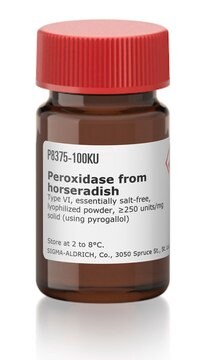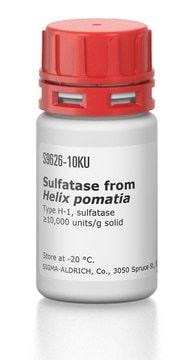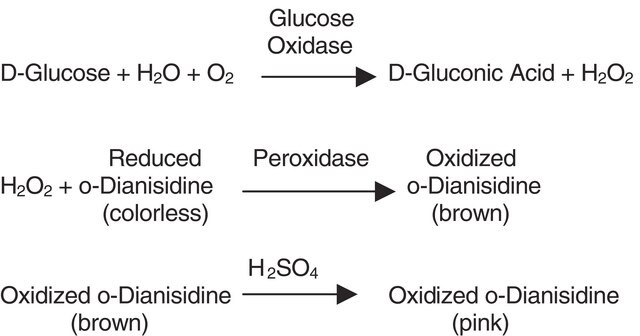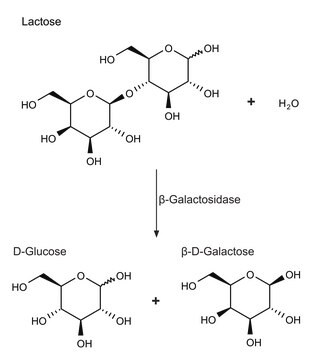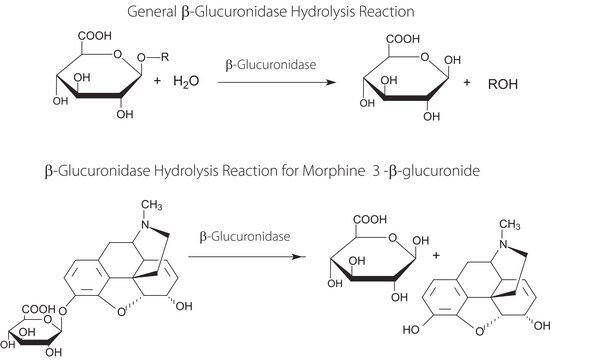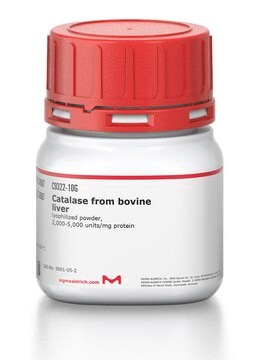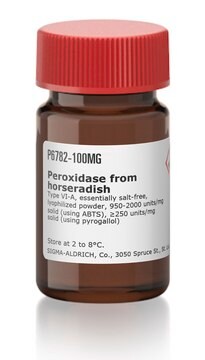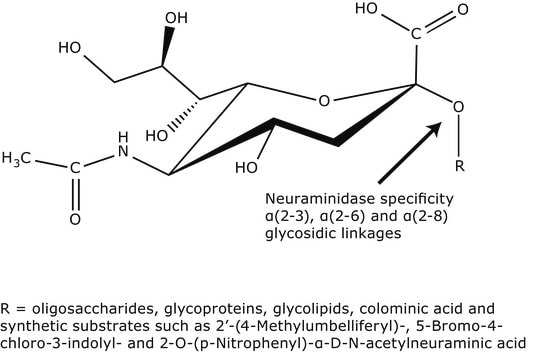G7907
Galactose Oxidase from Dactylium dendroides
≥30 units/mg solid
Synonym(s):
D-Galactose:oxygen 6-oxidoreductase
Sign Into View Organizational & Contract Pricing
All Photos(1)
About This Item
Recommended Products
biological source
fungus (Dactylium dendroides)
Quality Level
form
lyophilized
specific activity
≥30 units/mg solid
storage temp.
−20°C
Looking for similar products? Visit Product Comparison Guide
General description
Galactose oxidase is a member of radicalcoupled copper oxidases family. It is a fungal secretory enzyme.
Galactose oxidase is an extracellular copper-containing enzyme, secreted by the deuteromycete fungus Dactylium dendroides. It catalyzes the oxidation of a range of primary alcohols, including D-galactose, to the corresponding aldehyde, with reduction of oxygen to hydrogen peroxide.
Application
Galactose Oxidase from Dactylium dendroides has been used as a component for galactose oxidase treatment of arabinogalactan. It has also been used to co-immobilise with peroxidase for the preparation of a biosensor for galactose detection.
Galactose oxidase may be used as an analytical tool for the specific determination of D-galactose in blood plasma, plant extracts, and phospholipids. It could be used for the characterization of terminal D-galactoside units in several polymers. It may also be useful in the determination of lactose.
Biochem/physiol Actions
Galactose oxidase catalyzes the coversion of D-galactose to D-galacto-hexodialdose.
2-Deoxy-D-galactose, lactose, melibiose, raffinose and stachyose react with galactose oxidase in the peroxidase:o-tolidine system.
Essentially no oxidation of D-glucose, L-galactose, L-arabinose or D-glucuronate has been observed.
2-Deoxy-D-galactose, lactose, melibiose, raffinose and stachyose react with galactose oxidase in the peroxidase:o-tolidine system.
Essentially no oxidation of D-glucose, L-galactose, L-arabinose or D-glucuronate has been observed.
Galactose oxidase has several applications in bioanalytics and histology. This free radical enzyme possess high substrate specificity.
Unit Definition
One unit will produce a ΔA425 of 1.0 per min at pH 6.0 at 25 °C, in a peroxidase and o-tolidine system. Reaction volume = 3.4 mL. Light path = 1 cm.
Physical form
Lyophilized, contains buffer salts and stabilizer
Preparation Note
Chromatographically purified
inhibitor
Product No.
Description
Pricing
signalword
Danger
hcodes
pcodes
Hazard Classifications
Resp. Sens. 1
Storage Class
11 - Combustible Solids
wgk_germany
WGK 1
flash_point_f
Not applicable
flash_point_c
Not applicable
Certificates of Analysis (COA)
Search for Certificates of Analysis (COA) by entering the products Lot/Batch Number. Lot and Batch Numbers can be found on a product’s label following the words ‘Lot’ or ‘Batch’.
Already Own This Product?
Find documentation for the products that you have recently purchased in the Document Library.
Customers Also Viewed
Rapid and sensitive galactose oxidase-peroxidase biosensor for galactose detection with prolonged stability
Tkac J, et al.
BioTechnology: An Indian Journal, 13(12), 931-936 (1999)
Development of an immunoassay for larch arabinogalactan and its use in the detection of larch arabinogalactan in rat blood
Groman E V and Gou D
Carbohydrate Research, 301(1-2), 69-76 (1997)
Copper metalloenzymes
Comprehensive Natural Products II (2010)
M J McPherson et al.
The Journal of biological chemistry, 267(12), 8146-8152 (1992-04-25)
The gaoA gene, encoding the secreted copper-containing enzyme galactose oxidase, has been isolated from the Deuteromycete fungus Dactylium dendroides. Degenerate oligonucleotide primers were designed from amino acid sequence data for use in the polymerase chain reaction. A 1.4-kilobase DNA fragment
Takeshi Ito et al.
Talanta, 85(1), 707-712 (2011-06-08)
We proposed a low cost fabrication procedure of a poly(methylmethacrylate) (PMMA) column chip. 3D microchannel structure consisting of four columns in a chip for a mother die was fabricated using dry film photoresist and photolithography technique. Electroforming was applied to
Our team of scientists has experience in all areas of research including Life Science, Material Science, Chemical Synthesis, Chromatography, Analytical and many others.
Contact Technical Service
